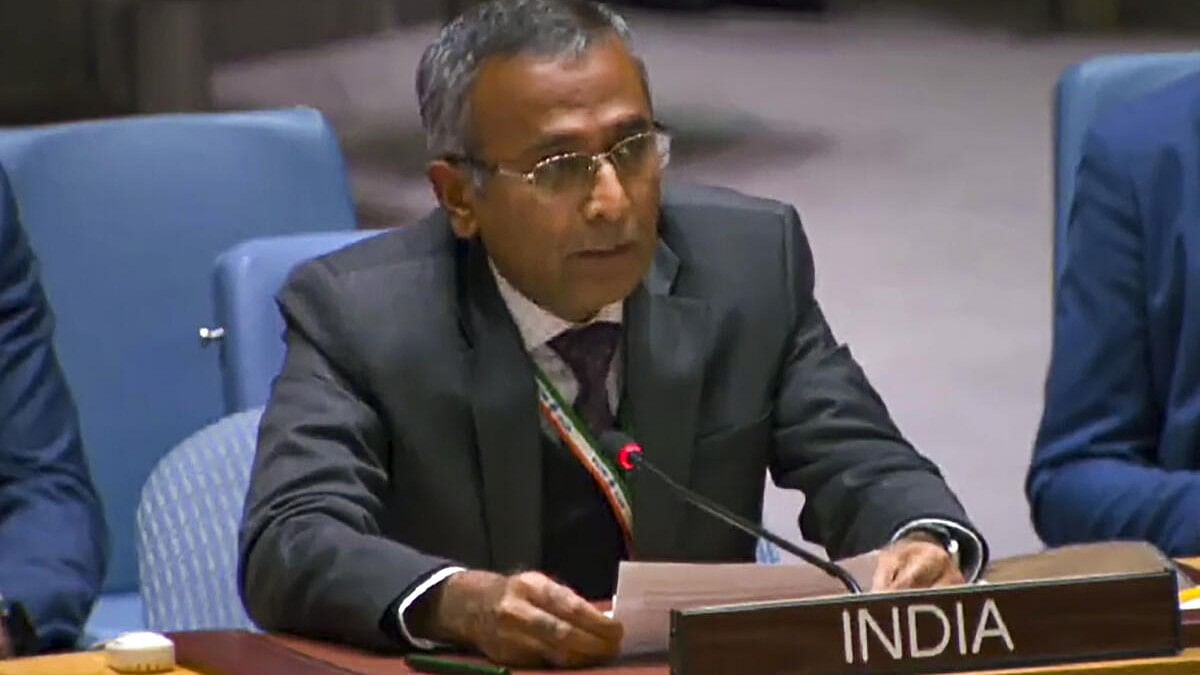
India’s Deputy Permanent Representative at the UN Ambassador R. Ravindra speaks during a United Nations Security Council meeting on the Israel-Gaza situation, in New York.
Credit: PTI File Photo
The abstention vote on the UN General Assembly resolution calling for an immediate humanitarian ceasefire removed any vagueness and tentativeness in the Indian position vis-à-vis the Israel-Hamas conflict. The Friday resolution sponsored by Jordan and scores of Muslim-majority countries was adopted by 121 countries voting in favour, 14 voting against, and 44 abstaining. Before this vote, the 10th special session of the General Assembly rejected an amendment moved by Canada by 88 in favour to 55 against, with 23 abstentions. While India voted for the Canadian resolution, it abstained on the more crucial resolution sponsored by 45 countries, including Jordan.
While both aimed to bring about a ceasefire to the three-week-old conflict, the emphases and prejudices are obvious. Reflecting the prevailing mood in the Middle East, the Jordanian resolution referred to various UN resolutions adopted earlier, but it did not go beyond “expressing grave concern at the latest escalation of violence since 7 October.” It avoided making any direct or indirect reference to Hamas, which carried out the attack. It is also silent on the Israelis who were taken hostage by the militant Palestinian group and its allies. The prime focus of the Friday resolution was to alleviate the suffering of the Palestinians in the Gaza Strip without any demand for the safe return of the abducted Israelis.
The Canadian resolution sought to modify these anomalies by adding the UNGA’s rejection and condemnation of “the terrorist attacks by Hamas that took place in Israel starting on 7 October 2023, and the taking of hostages, demands the safety, well-being and humane treatment of the hostages in compliance with international law, and calls for their immediate and unconditional release.” The amendment merely referred to the Israeli side of the conflict while reiterating the demand for an immediate humanitarian ceasefire. As US Ambassador to the UN Linda Thomas-Greenfield reminded UNGA, two key words were missing in its resolution: Hamas and hostages.
India voted for the Canadian resolution and abstained on the Jordanian resolution. Explaining its decision, New Delhi flagged its resolute opposition to the ‘malignancy’ of and ‘zero-tolerance’ towards terrorism. It reiterated support for a two-State solution leading to “a sovereign, independent and viable State of Palestine living within secure and recognised borders, side-by-side in peace with Israel.” Though unpopular among certain countries, the explanatory statement also described the terror attacks in Israel as “shocking and deserve condemnation” and called for the “immediate and unconditional release” of hostages.
India’s voting reflected this concern and is in line with its position since the outbreak of the conflict on October 7. While not prepared to describe Hamas as a terrorist organisation — as Israel, the US and some European Union countries do — in his first public statement on the crisis, Prime Minister Narendra Modi expressed deep shock at “terrorist attacks in Israel.” Ministry of External Affairs spokesperson Arindam Bagchi explained this stand during his long interaction with the media on October 12.
In recent days, Israel has been pressuring India to denounce Hamas as a terrorist organisation, and its Ambassador Naor Gilon told the Indian media: “We raised the issue after the attack, and we are still in dialogue. We are speaking to India. It is a friendly talk...we see eye-to-eye on the vast majority of things, including on counter-terrorism and other strategic issues.” Moreover, influential figures in the Middle East have been questioning Hamas’ strategy. Former Saudi Ambassador to the US and UK Turki al-Faisal told the Baker Institute in Austin, Texas: “I categorically condemn Hamas’ targeting of civilian targets of any age or gender as it is accused of. Such targeting belies Hamas’ claims to an Islamic identity. There is an Islamic injunction against the killing of innocent children, women, and elders. The injunction is also against the desecration of places of worship.” Of late, some Arab journalists have been drawing parallels between Hamas and ISIS, unthinkable even a few weeks ago.
Indeed, 55 countries sought a balance in the UNGA vote, indicating significant reservations some countries had towards the one-sided Jordanian resolution. For long, India has been criticising China over the latter’s lenient attitude towards the perpetrators of the 26/11 terror attacks; and voting against or abstaining from the Canadian amendment would have been a setback in India’s fight against terrorism.
At the same time, painting Hamas as a terrorist organisation is unpopular even in India. As Congress MP Shashi Tharoor found out recently, even describing the Hamas attacks on October 7 as ‘terrorist’ is unpopular among a significant section of the Indian population. Even non-Muslim opposition leaders are taking exceptions to this description. The Indian government does not adhere to the ends-justify-means logic and is prepared to differentiate between the legitimate Palestinian rights and the illegitimate use of terrorism by Hamas. Therein lies the Indian message through abstention.
(The writer teaches contemporary Middle East at Jawaharlal Nehru
University)